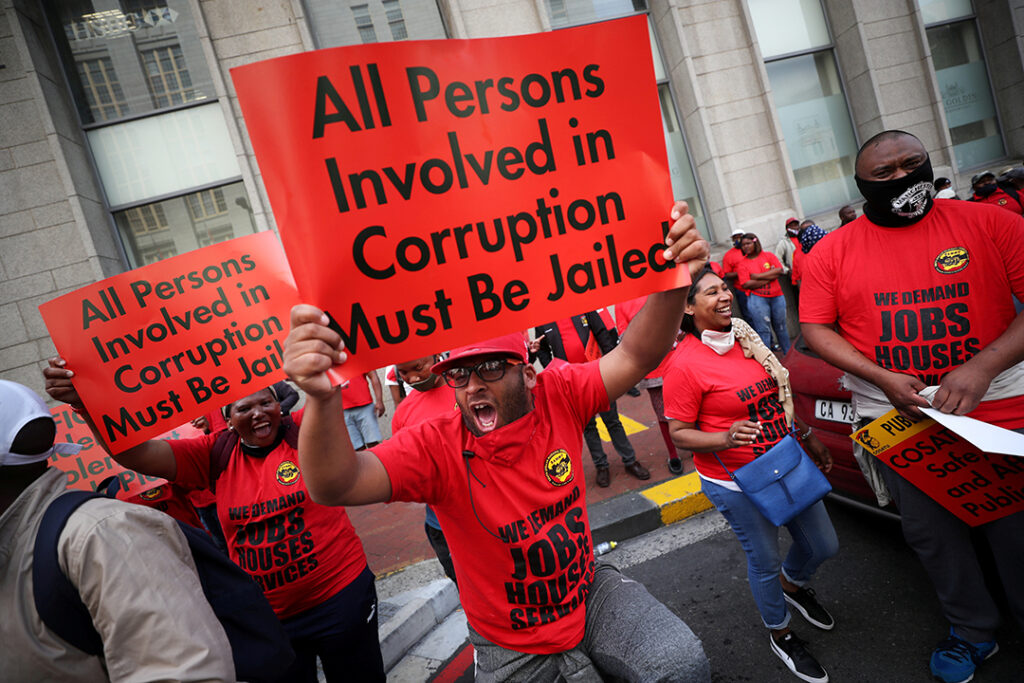ADF STAFF
Minutes after dropping her daughter off at school on August 23, 2021, Babita Deokaran returned to her home in south Johannesburg, where she was killed in a hail of bullets by paid assassins.
The Gauteng health department chief financial officer’s death was related to COVID-19 corruption. She had been a whistleblower working as a witness with law enforcement investigating a $20 million personal protective equipment (PPE) scandal.
“She looked at the companies who were doing business with the hospital, and she found that there were hundreds of nameless, faceless companies with no public presence whatsoever, invoicing the department huge sums,” said journalist Jeff Wicks, a member of South Africa’s News24’s investigative team.
Deokaran’s murder is symbolic of the depth and scope of state corruption that has plagued the continent. The scourge of corruption appeared during the pandemic, exacerbating the already devastating effects of COVID-19 on Africa’s economies. More than 100,000 South Africans have died since the pandemic began.
“Corruption is criminal, immoral and the ultimate betrayal of public trust,” United Nations Secretary-General António Guterres said in October 2020. “The response to the virus is creating new opportunities to exploit weak oversight and inadequate transparency, diverting funds away from people in their hour of greatest need.”
In conjunction with African Anti-Corruption Day on July 11, the African Union Advisory Board Against Corruption (AUABC) and the Centre for Democracy and Development (CDD) called on African leaders to better manage COVID-19 funds and prevent corruption with greater transparency.
“Corruption and illicit financial flows are twin evils that constrain Africa’s progress and development. Regrettably, the utilization of the COVID-19 funds has also become a major source of Africa’s corruption conundrum,” the CDD said.
“Unfortunately, the COVID-19 funds and resources in many countries are dodged by opacity and misuse, complicating the already bad corruption situation in Africa.”
Corruption has been a huge problem throughout Africa for generations.
When the pandemic hit, large sums of money flowed from donor agencies into Africa. The World Bank and the International Monetary Fund delivered about $57 billion.
Christopher Stone, professor of practice of public integrity at England’s University of Oxford, said COVID-19 was an extreme stress test for the continent’s anti-corruption institutions.
“Corruption loves a crisis, the bigger the better,” he wrote in a December 2021 blog post. “The reason is obvious: big crises lead governments to spend big money, and quickly, suspending the regulations and checks that try in normal times to block corruption’s way.”
Across Africa, accountability policies that monitor the use of government funds were relaxed to fast-track the procurement of essential goods and services and PPE. Most countries operated under a state of emergency.
Corruption thrived:
- Tens of millions of dollars of irregular contracts led to South Africa placing its health minister on leave. The suspected inflation of government contracts to buy medical supplies worth $900 million also sparked public outcry.
- Kenya’s Ethics and Anti-Corruption Commission accused the state-run Kenya Medical Supplies Authority of stealing about $400 million meant to buy medical equipment. The Auditor-General’s report on COVID-19 expenditures revealed the misuse of more than $69 million.
- Zimbabwe’s health minister was fired and faced corruption charges for illegally awarding a multimillion-dollar contract.
- About $333 million earmarked for Cameroon’s COVID-19 response in 2020 was misused, according to a 2021 audit.
- Malawian government officials in conjunction with private sector entities misspent $1.3 million in pandemic funds.
Enoch Randy Aikins, a researcher with the South Africa-based Institute for Security Studies, said most COVID-19 expenditures in Africa have not been audited.
“The continent has not made real progress in uncovering graft through proper audits of COVID-19 expenditures by governments and their agencies,” he wrote. “These audits are vital and must be followed by investigations and prosecutions that enable the recovery of state money.”
The AUABC and CDD recommended employing technology in the effort.
“Technology is a very important tool that should be harnessed to improve transparency and help reduce opportunities for corruption,” the AUABC stated in an Anti-Corruption Day meeting. “E- procurement systems, digitized budgets go a long way in building the citizens trust.”
Transparency International Vice Chairman Rueben Lifuka called on the AU and its members to take stronger anti-corruption action.
“This is a critical moment for the African region and its people,” he said in a statement. “If corruption is not addressed urgently, it will block efforts to rebuild after the devastating pandemic and the region’s hopes of charting a path to a stronger future.
“Fairly and transparently managing large-scale COVID-19 recovery funds and preventing billions of dollars from illegally exiting the region through illicit means should be top issues for all leaders.”

